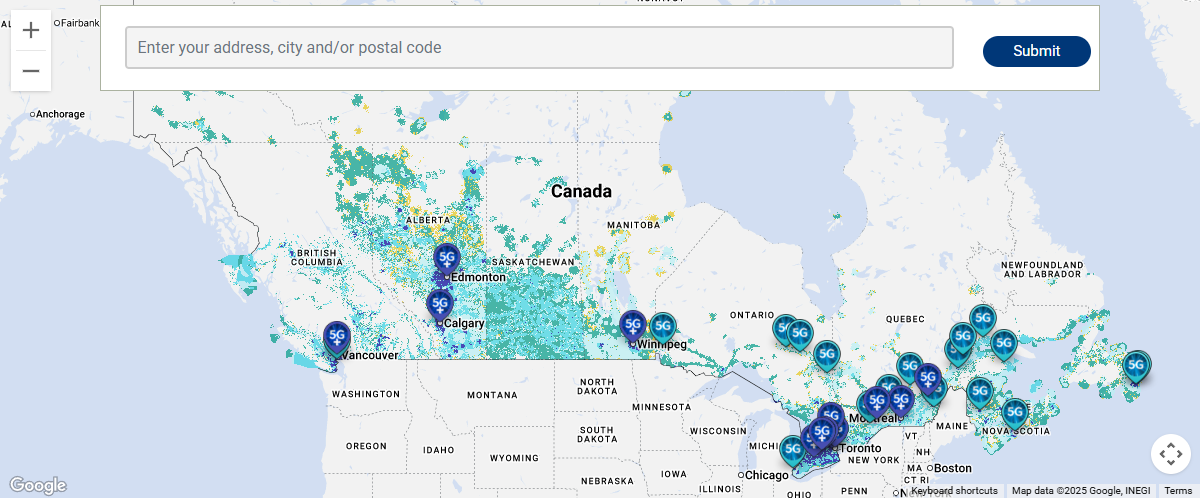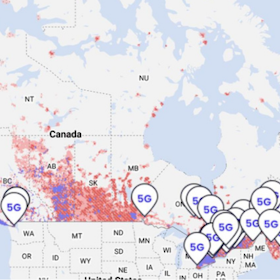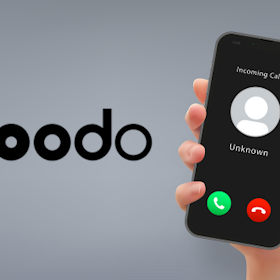
In Canada’s Big Three telecom landscape, Bell and Telus sit side by side at the top, sharing network infrastructure and reaching almost every corner of the country. Both carriers provide dependable 5G+ coverage, generous data buckets, and a handful of bundled perks to sweeten the deal.
Still, for all their similarities, subtle differences matter. After testing Bell’s Ultra (formerly Elite 250) plan for a month across Toronto and rural Southern Ontario, and comparing those results to my time on Telus’s 5G+ Complete plan, the distinction becomes clearer. Bell continues to impress with consistency and solid speeds, but Telus edges ahead in total performance, coverage, and plan flexibility.
If you want the best network experience Canada can offer right now, Telus is the stronger overall carrier. Bell remains an excellent, premium-priced alternative, but Telus’s combination of reliability, rural reach, and bundled extras gives it a well-deserved edge. Telus is the clear winner if you're in the market for a new plan. Let us break down why that is below.
Down to brass tacks: Bell vs. Telus 5G carrier overview
Both Bell and Telus support premium-priced plans for Canadians to choose from. On average, the cheapest 5G plan available sits at around $80 per month. From there, you can find high-priced plans with larger data allotments and some additive plan perks. After reviewing Bell and Telus independently, let's take a look at which carrier offers the more bang for your buck.
| Bell | Telus | |
|---|---|---|
| Plan prices | $80–$110/month | $85–$115/month |
| 5G networks and speeds* | Up to 1.7Gbps | Up to 2Gbps |
| Family plan discounts | As low as $48/line | As low as $55/line |
| Perks and extras | 3 months of Sportsnet | 3 months of Stream+ for $10 |
| WhistleOut rating | ||
| Shop plans | Shop plans |
The bottom line:
Bell and Telus both deliver exceptional network experiences. Bell wins for bundled entertainment and reliability, while Telus outpaces it on raw 5G+ performance and coast-to-coast consistency. Bell and Telus operate with very similar costs across the board. Though Bell is routinely a bit cheaper, falling around $5/month less than its competitor. So, if you're looking at long-term savings, Bell is the carrier to consider, as over 12 months, you could save at least $60.
Telus has the superior connectivity of the two. Providing up to 2Gbps speeds on its 5G+ network, if you're in a supported area, you'll receive the best service available. For customers in Ontario, Saskatchewan, and Alberta, the 5G network spans far beyond the metro cities like Toronto and Edmonton. So, those in smaller, more rural areas still have a good chance of taking advantage of Telus' 5G speeds, which is perfect for streaming content and heavier data demands when not on Wi-Fi.
Reviews and ratings: How Bell and Telus stack up
At WhistleOut, we take a look at carriers and their services across five key metrics. This includes price, value, speed, coverage, and customer service. Each metric is rated out of five stars, which are averaged to calculate the overall score.
- – Price: 3 out of 5
- – Value: 4 out of 5
- – Data speeds: 5 out of 5
- – Coverage and network reliability: 5 out of 5
- – Customer service: 3.5 out of 5
Bell’s rating details
My month of testing Bell’s Max plan affirmed why the company is held to such high regard in comparison to Canada's carriers. Across downtown Toronto, Bell’s 5G+ speeds consistently clocked around 200–250Mbps, rarely dipping below 165 Mbps indoors. The connection was steady enough to handle my Zoom calls, upload large video files to my Google Drive, and even run Xbox Cloud Gaming on my iPhone 16.
Bell’s network reliability is excellent, especially in major cities. Even underground along the TTC, calls and data held steady. The carrier’s infrastructure is vast, supporting 99% of Canada’s population. While 5G+ availability drops outside urban cores, Bell’s LTE and LTE Advanced coverage fills the gaps effectively.
Where Bell begins to lose footing is in its price and customer service. Its Elite plans push past $100 per month on BYOD, making it one of the more expensive providers in Canada. While Bell's plans are cheaper than Telus' prices, the value proposition begins to fall apart when looking beyond the base plan. The only meaningful plan perk is the inclusion of Crave Basic, which feels like a drop in the bucket compared to Telus.Telus' rating details
Switching to Telus’s 5G+ Complete plan felt like flipping the network quality up another notch. In testing across Toronto, Mississauga, and smaller communities near Guelph, I consistently saw download speeds between 250 Mbps and 300 Mbps, occasionally spiking above that in optimal zones. Upload speeds hovered around 60–80Mbps, ideal for remote work, social content, and hotspot use.
Telus also shines in rural areas, particularly in Southern Ontario, where its 5G+ coverage is spreading faster than Bell’s. Streaming over Netflix and YouTube was seamless, and latency while gaming on Xbox Cloud or Amazon Luna was minimal. Bar none, Telus offers the best stream-ready network I've tested thus far.
The Stream+ bundle (combining Netflix, Disney+, and Prime Video trial offers) and Easy Roam at $5/day for U.S. travel make Telus’ top-tier plans feel more complete. Sure, I ended up paying marginally more on Telus' plan, but the long-term benefits and network stability made up for the premium price. You get arguably the most future-ready 5G+ network in Canada while using Telus' service.Bell vs. Telus price comparison
Bell and Telus provide three core plans to choose from. Bell offers its Select, Max, and Ultra plans, ranging from $80 to $110/month. The Elite 100 is the most entry-level to choose from.
Telus, on the other hand, offers its 5G+ Complete, 5G+ Complete CAN-US, and 5G+ Complete Explore plans, all of which range from $85 to $115/month. In the case of Telus, its 5G+ Complete plan is the most cost-efficient but offers the smallest data bucket out of the three.
The cost difference between Bell and Telus is minimal. Each one provides access to their respective 5G network alongside Canada-wide talk and text, as well as other benefits. Benefits include access to international texting from Bell or Telus' offer of three months of Stream+ for $10/month.Compare specific Bell and Telus plans
Check out the postpaid unlimited plans offered by Bell and Telus below:
| Bell | Telus | |
|---|---|---|
| Plan | Essentials | 5G+ Complete |
| Mobile Data | 100GB | 100GB |
| Coverage | 5G+ | 5G+ |
| Speeds | Up to 1Gbps | Up to 1Gbps |
| Perks and extras | Unlimited international texting |
3 months of Stream+ for $10/month, 5-Year Rate Price Lock |
| Price | $80/mo | $85/mo |
| Shop plans | Shop plans |
Premium unlimited data plans
From a top-level perspective, Bell and Telus operate almost identically. In fact, the two share the same network towers. So, when we look at the meaningful differences, we have to dive a little bit deeper than which carrier offers the best unlimited data plan. This is because the entry-level plans from Bell and Telus provide the same 100GB of 5G+ data as well as unlimited talk and text within Canada. Even when we look at download speeds, Bell supports a fantastic 1.7Gbps, which can handle nearly anything you'd ever need. Though Telus edges out its competition with 2Gbps download speeds.
| Bell | Telus | |
|---|---|---|
| Plan | Ultra | 5G+ Complete Explore |
| Mobile Data | 250GB | 250GB |
| Coverage | 5G+ | 5G+ |
| Speeds | Up to 1Gbps | Up to 2Gbps |
| Perks and extras | Unlimited international texting
Creave Standard (with ads) One year Perplexity Pro AI |
3 months of Stream+ for $10/month, 5-Year Rate Price Lock |
| Price | $110/mo | $115/mo |
| Shop plans | Shop plans |
If 100GB is not enough for your monthly smartphone usage, Bell and Telus support 175GB and 250GB plans as well. With upwards of 250GB available, you'll have enough runway to upload larger video files to the cloud when hotspotting, power your workflow if working off Wi-Fi, and stream content from Netflix or Prime Video. Plus, in any case, if you exceed your monthly allotment, you'll be granted throttled access with reduced 512Kbps speeds.
For cost-saving measures, you can bundle your Bell plan with the Fibe Internet package. Bell knocks $25 off your monthly mobile cost. For instance, you can pair the Ultra plan with Bell's Gigabit Fibe 3.0 internet for some really tantalizing savings. Here's a quick breakdown:
- Bell Ultra BYOD: $100/month (after $10/month Autopay credit)
- Bell Gigabit Fibe 3.0: $140
- Total including 2-year credits: $165/mo (regularly $210)
Telus offers similar incentives outside of its mobility services. Customers can combine PureFibre Internet with TV for as low as $125/month. Telus’s bundling portal also includes smart-home or security system discounts. So, if you're looking to go all-in on Telus' services, you can save some money beyond what's spent on your phone bill.
Bell vs. Telus family plans
If you're thinking of activating more than one line on an account, you'll be able to save some monthly costs. By adding friends or family to a single account, you can unlock monthly savings. The more lines you have activated, the more those lines will save you each month.
As we look deeper, it's clear that Bell supports the cheaper family plan discounts. Bell offers family plan pricing with costs going down to as low as $48/month with a four-line plan. Bell allows customers to mix and match tiers on each line.
Here’s a table of Bell’s family plan discounts and prices for each line:| Plan | First line | 2nd line | 3rd line | 4th line+ | Total for four lines |
|---|---|---|---|---|---|
| Select (BYOD) | $80/mo | $62/mo | $55/mo | $48/mo | $235/mo |
| Max (BYOD) | $90/mo | $72/mo | $65/mo | $58/mo | $275/mo |
| Ultra (BYOD) | $105/mo | $92/mo | $85/mo | $78/mo | $355/mo |
Telus also offers savings under its family plan option. Here, plans go as low as $65/mo for the fourth line on the account.
Here’s a table of Telus' family plan discounts and prices for each line:| Plan | First line | 2nd line | 3rd line | 4th line+ | Total for four lines |
|---|---|---|---|---|---|
| 5G+ Complete | $80/mo | $72/mo | $70/mo | $65/mo | $287/mo |
| 5G+ Complete Canada-US |
$90/mo | $82/mo | $80/mo | $75/mo | $327/mo |
| 5G+ Complete Explore |
$105/mo | $97/mo | $95/mo | $90/mo | $345/mo |
As mentioned, Bell's family plan savings make the carrier the winner of the two. Although there's not a major difference, activating four lines on Bell can save you at least $52/month when compared to a similar package with Telus.
- The difference between the two carriers is even more evident when we look at the annual savings.
4 lines of Bell's Select ($235) x 1 year = $2,820 annually per family
4 lines of Telus 5G+ Complete ($287) x 1 year = $3,444 annually per family
Also, Bell and Telus allow for more than four lines to be activated on a single account. However, there are no additional savings for the fifth, sixth, or later. line that's activated. Everything beyond is capped at the same discount as the fourth line.
Plan Perks
While pricing between Bell and Telus is fairly tied, the differences in value boil down to some of the plan perks. In both cases, the higher the plan's tier, the more additional benefits you'll gain access to. Overall, Telus provides far more perks to go alongside its monthly plan.
Bell's perk packages start with SD video streaming and one year of the Perplexity Pro AI research tool. As you look forward to the Max and Ultra tiers, Bell increases video streaming to HD quality and throws in a subscription to Crave Standard. However, Telus has what I believe to be more tantalizing perks, including Stream+ for $10/month for the first three months. Bundling Netflix Standard, Amazon Prime, and Disney+ (with ads) for $23 afterward can save me $18 per month, as these services would typically cost a combined $41/month. Telus also throws in its 5-Year Rate Plan Price Lock policy, which guarantees your monthly rate will not increase during this time.
Here's a complete list of Telus' perks on the 5G+ Complete plan:
- Nationwide data, talk, and text
- Unlimited long-distance minutes for calls to 27 international destinations
- Unlimited international messaging
- Get Stream+ for $10 per month for 3 months
- 5-Year Rate Plan Price Lock
- Easy Roam from $5/day
Bell vs. Telus mobile network coverage and speeds
Bell is largely considered to have the fastest 5G network in Canada (sharing towers with Telus), according to Ookla. That said, both carriers support a 4G LTE network to 99% of the population, supporting the largest 4G network in the country. As we look at the differences between 5G coverage, however, we'll see more of a difference between Bell and Telus.
For both carriers, the 5G coverage is growing at a rapid rate. Outside of the metro cities, you can find 5G+ supported in multiple areas; the infrastructure provides 5G connectivity to some smaller, more rural areas. This largely includes Southern Ontario and Quebec, where 5G signals are fairly consistent. With this in mind, Telus' 5G network spans far more rural areas than Bell's. For a more in-depth comparison, check out the coverage maps below.
Rogers coverage map

Image: Bell
Bell's 5G+ services are generally far-reaching across Canada. The carrier's 5G service is available to 70% of the country while also covering 36% of the country's land mass. For now, Bell 5G+ is only available in select areas–including Vancouver, Calgary, Edmonton, Winnipeg, Toronto, and Montreal. That said, the carrier is continually expanding its 5G+ services.
Although minor outages have been experienced on the Bell network (a recent one hitting Ontario and Quebec in May), Bell customers haven't faced major issues in many years.Telus coverage map

Image: Telus
Telus shares infrastructure with Bell but was crowned the 'Top Rated Mobile Provider in Canada' by Ookla this year. Its 5G+ service is available in all major centres and extends further into smaller communities across B.C., Alberta, and Ontario. In real-world tests, Telus delivered 200–350Mbps downloads and stable uploads of 70–90Mbps.
That extra headroom makes a difference when hotspotting a laptop, streaming 4K video, or gaming remotely. Even when coverage drops to 4G LTE, Telus maintains a remarkably stable signal.
Customer service
If you're like me, you probably do everything in your power to avoid contacting customer service. Sometimes you're simply unable to skip it, so it's nice to know which carrier offers the best customer service in the event you need to conduct some account maintenance or ask a billing question.
During my testing of Bell's services, I contacted the customer service line to test the efficiency and helpfulness of the agents. During the process, I spent about 15 minutes on hold before speaking to someone. Bell's representative was very quick to answer my questions and was able to get me the information I wanted efficiently.
Similarly, I contacted Telus to see its customer service experience. Here, I was stuck on hold for 20 minutes after I struggled to find a contact number on the carrier's site. After reaching a representative, the person I spoke to was much more willing to help me over the phone.
Based on my experiences, Bell provides a slightly better customer experience. Though if you're looking for more hands-on options, Bell and Telus both support their respective apps in which you can manage your account settings, billing, make changes and interact with an AI-powered chatbot.Final recap: Is Bell or Telus better for you?
Bell and Telus are some of the most reliable Canadian carriers available, with outstanding 5G coverage and speeds. Both offer services with similar prices. With so many similarities, it comes down to stability, plan perks, and having a plan that matches your lifestyle. With this in mind, I firmly believe that Telus offers the best value overall, even though it's a bit more expensive.
With this in mind, Bell is a great option for Canadians who wish to have solid 5G coverage in and around Canada's metro cities. With the added benefit of a Crave subscription on higher-tiered plans, you can stream some HBO content for no additional costs. However, added savings come down to bundling your service with Fibe internet or taking advantage of the carrier's family plan options.
Telus, on the other hand, excels in 5G coverage, spanning more areas in Canada, especially in Ontario, Alberta, and Saskatchewan. Granting access to Stream+, you can cut down subscription costs for Netflix, Prime Video and Disney+, which could have some great long-term savings benefits. Plus, Telus offers its 5-Year Rate Plan Price Lock, ensuring your plan won't be met with surprise price increases. While you may be paying slightly more each month, there's far more value to be gained from Telus. The quality of its 5G service is also worth the squeeze.
Switch to Bell or Telus
Both carriers allow easy BYOD sign-ups and eSIM activation. Be sure to check coverage maps before committing to ensure you’ll get the desired speeds in your area. And if you decide to swap, we can also walk you through how to swap carriers while still keeping your existing number.
How WhistleOut rates cell phone plans
WhistleOut evaluates phone plans based on the following criteria:
- Price & value: Not all cheap plans are “bad,” and not all expensive plans are worth it. We look at everything a plan includes and compare it both to other plans from the same carrier, as well as similar plans from competitors in the market, to determine whether the value is consistent with the price.
- High-speed data: Also called “premium” data, this is how much data you get at full 4G/5G speeds before they can or will slow down. The more guaranteed high-speed data the plan includes, the better experience you’ll generally have—but there’s also usually a limit to how much you actually need, and we ensure that you’re not overpaying for data that will go unused.
- Coverage & network reliability: The breadth of each carrier’s 4G LTE and 5G networks determines your reception and service. Particularly in the case of 5G, some carriers offer far more robust coverage than others, which affects how their phone plans perform in different parts of the country.
- Plan extras and perks: In addition to the basics—talk, text, and data—some plans throw in freebies like hotspot allowances, cloud storage, entertainment subscriptions, or service discounts.
Our mobile experts tested Bell and Telus for at least a month each, in addition to leveraging proprietary data and real-world customer feedback. We compared the two carriers by analyzing their coverage, cost, and plan options. We considered plan-specific elements, including perks, premium data allowances, and customer service. After performing hands-on testing and extensive research, we picked the best carrier we felt met the needs of most people. In some areas, each carrier stacked up equally. We only compared Bell versus Telus; no other carriers, big or small, were included in our comparison testing.
Visit our guide to choosing a phone plan to learn more about cell phone carriers and plans, and find the one that best meets your specific needs.FAQs
Steve Vegvari

Steve Vegvari is a 10-year writer in the gaming and tech space, writing for several Canadian publications. He's covered everything from the latest marquee games and hardware to smartphones, smart home devices, TVs, and smart lights. Steve emphasizes his love of weird, experimental tech while uncovering the pros and cons of the Canadian mobile market.
Related Articles
Related Topics
Bell Telus Cell Plans BYO Cell Plans Big Carrier VsPopular Topics
Android Apple iPhone Samsung Google iOS Cell phone plans Rogers Telus BellFind Better Phones and Plans
Hundreds of cell phone plans unpacked. All the facts. No surprises.
































.jpg?w=280&h=280&usm=20&usmrad=0.8&fit=crop)






